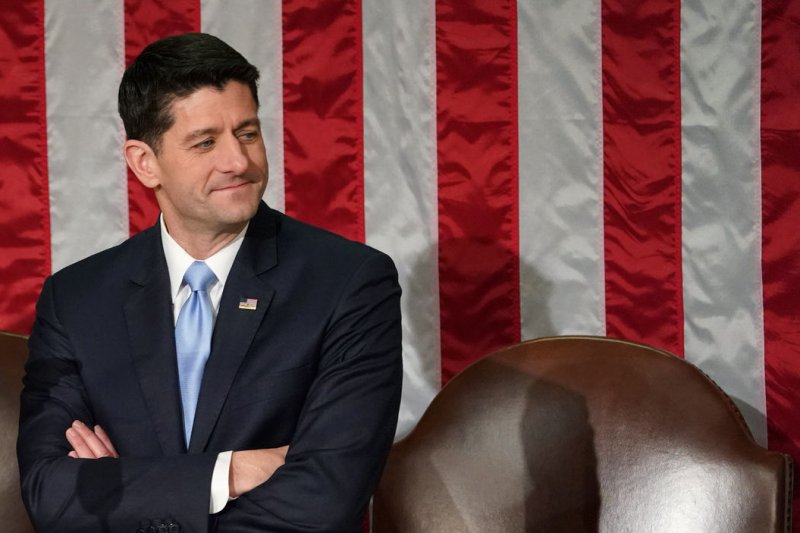House Speaker Paul Ryan says both parties made concessions in a new budget bill, though depending on sales from strategic oil stockpiles was met with criticism. File photo by Kevin Dietsch/UPI |
License Photo
Feb. 9 (UPI) -- A component of the bipartisan U.S. spending bill that called for the sale of strategic oil reserves was a consideration met with criticism on Friday.
A section of the spending bill signed by U.S. President Donald Trump early Friday morning called for the sale of barrels from the Strategic Petroleum Reserve such that it won't exceed $350 million in the current fiscal year. Hundred of million barrels of SPR sales are envisioned over the next decade under the measure passed by both houses of Congress.
As of Feb. 2, there were 665 million barrels stored in the SPR. It has a design storage capacity of 713.5 million barrels.
President Gerald Ford set the strategic reserve in motion in 1975 in part as a response to an oil embargo enacted by Arab members of the Organization of Petroleum Exporting Countries frustrated by U.S. policies on Israel.
The reserve is typically tapped only in a case of emergency, such as in response to shortages from Middle East producers ensnared by the Arab Spring movements in 2011. Healy E. Baumgardner, a global fossil fuel adviser at The 45 Group, former Trump campaign spokeswoman and the former press secretary for the Energy Department under President George W. Bush, told UPI using the SPR as a piggy bank was short-sighted.
"The SPR is a key component of national security, not a tool to balance the markets, or in this case, act as an actual government bailout to meet budget needs," she said. "Congress should seek money elsewhere starting with their own frivolous spending before jeopardizing our national security to cover their own asses."
The U.S. Energy Department last year agreed to the sale of 8 million barrels of light, sweet crude oil from the SPR. The release fell under a measure passed in December 2016 that allows for the sale of up to $375.4 million in strategic reserves to finance its upkeep and modernization.
In August, the Energy Department approved of swaps out of the SPR to help keep the refineries hit by Hurricane Harvey satiated. Additional sales were permitted under the 21st Century Cures Act and the Energy Department said the revenue would go to a general fund to support health innovation projects as designated under the measure.
A proposal to balance the budget last year from President Trump relied in part on SPR sales. The release from strategic barrels, meanwhile, comes as the United States rivals Saudi Arabia in terms of oil production.
House Speaker Paul Ryan said Friday the budget deal calls for reforms of Medicare, repeals some elements of the Affordable Care Act and provides disaster relief to Puerto Rico, Texas and other regions hit hard by last year's hurricanes.
"Ultimately, neither side got everything it wanted in this agreement, but we reached a bipartisan compromise that puts the safety and well-being of the American people first," he said in a statement.
In expressing its opposition, advocacy group Friends of the Earth said the plan spends more on defense than social programs and includes perks for the oil industry.
"Congress is trying to sneak in another huge tax break for Big Oil while handing the Pentagon a giant raise," campaigner Lukas Ross said in an emailed statement.















